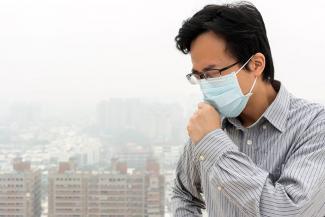
Dr Radha Goyal, Deputy Director of Indian Pollution Control Association (IPCA), New Delhi, shares the research on how the carcinogenic elements in the air we breathe are lethal in more senses than one.
The current pollution levels in our country, particularly in Delhi/NCR – how threatening is it for lung cancer cases?
The latest urban air quality database released by the World Health Organization (WHO) reconfirms that most Indian cities are becoming death traps because of very high air pollution levels. India appears among the group of countries with highest particulate matter (PM) levels. Of the 20 most polluted cities in the world, 13 are from India, says the database. The Global Burden of Disease report (2014) pinned outdoor air pollution as the fifth and indoor air pollution as second largest killers in India with approximately 527,700 deaths every year.
In recent times, Delhi has been hit by exceptional health crisis due to trapping of poisonous substances (such as particulates and gases like NOx and CO). Delhites are all living and breathing in gas chamber, and respiratory emergencies have tripled in the last 7-8 years with no relief in sight.
Almost 18 million years of healthy lives are lost due to illness burden that enhances the economic cost of pollution. Deaths from air pollution were a result of diseases such as heart disease, stroke, lung cancer, and chronic obstructive pulmonary disease (COPD). In 2015, all forms of pollution combined were responsible for 21% of all deaths from cardiovascular disease, 26% of deaths due to ischaemic heart disease, 23% due to stroke, 51% to chronic obstructive pulmonary disease, and 43% due to lung cancer.
How to manage COPD at Home E-Book
Download Live Better with Asthma E-Book
Does it only cause lung cancer?
The air we breathe is laced with cancer-causing substances and is being officially classified as carcinogenic to humans. The International Agency for Research on Cancer (IARC) cited data indicating that in 2010, 223,000 deaths from lung cancer worldwide resulted from air pollution. Also,there was also convincing evidence that air pollution has been linked to several malignancies, including lung cancer, urinary bladder cancer, breast cancer, pancreatic cancer and acute leukaemia. The evidence is most abundant for lung cancer, for which several causal factors are well established.
Air Pollution in India is a combination of multiple particulates. Are all of them equally carcinogenic or is there a difference?
Air pollution, both indoors and outdoors, is a major environmental health problem affecting everyone in developed and developing countries alike. Any agent that spoils air quality is called air pollutant. Air pollution can be defined as the presence of pollutants,such as Carbon Monoxide(CO), sulphur dioxide (SO2), particulate Matter (PM), nitrogen oxides (NOX) and ozone (O3) in the air that we inhale at levels which can create some negative effects on the environment and human health.
Carbon Monoxide results in reduction of the amount of oxygen reaching the body’s organs and tissues; aggravates heart disease, resulting in chest pain and other symptoms.
Ground-level Ozone decreases lung function and causes respiratory symptoms, such as coughing and shortness of breath, and makes asthma and other lung diseases worse.
Lead- damages the developing nervous system, resulting in IQ loss and impacts on learning, memory, and behaviour in children. Cardiovascular and renal effects in adults and early effects related to anaemia.
Nitrogen Dioxide worsens lung diseases leading to respiratory symptoms and increased susceptibility to respiratory infection.
Particulate Matter short-term exposures can worsen heart or lung diseases and cause respiratory problems. Long-term exposures can cause heart or lung disease and sometimes premature deaths.
Sulphur Dioxide aggravates asthma and makes breathing difficult. It also contributes to particle formation with associated health effects.
Classifying outdoor air pollution as carcinogenic to humans is an important step: What is your opinion?
The air we breathe has become polluted with a mixture of cancer-causing substances. Outdoor air pollution is not only a major risk to health in general, but also a leading environmental cause of cancer deaths. The main sources of outdoor air pollution are transportation, stationary power generation, industrial and agricultural emissions, and residential heating and cooking. Some air pollutants have natural sources, as well.
There are many individual chemicals and specific mixtures that occur in outdoor air pollution which include diesel engine exhaust, solvents, metals, and dusts which are the major sources of pollution. Being categorised as carcinogenic will help in sending a strong signal to the international community to take action without further delay
What do you think should be done about it?
Air pollution is first and foremost a public health problem, in the sense that the air belongs to everyone but no single individual controls it. Air pollution must be addressed by collective action at local, regional, national, and international levels. A need to be raised via concerted public service messages, school education, as well as well-designed incentives and penalties to create the civic sense and responsibility among the people. Citizens certainly need to do their part to help reduce air pollution through their daily actions. But that won’t be enough. What will it take to get our state and central governments to also tackle the big-ticket items like emission standards, public transport, waste management, biomass burning, and dust reduction and to develop policies and implement measures to improve air quality to meet national standards/ guidelines.
How do you conduct awareness programmes?
The role of IPCA is to provide scientific information as a basis for taking appropriate actions. Our awareness programmes are for different stakeholders of the society, i.e. at school level, institutional level, RWA level, which includes knowledge on reducing the pollution contribution at individual level/ community level and how to protect your health from such exposures. Different solutions are also informed to protect them from exposure such as - information on indoor plants, home remedies and health care tips and tips to maintain good indoor air quality are discussed through our awareness programmes. E.g. Clean and Healthy Air Management Programme for Schools (CHAMPS) that we are conducting in the schools of Delhi and NCR.
Air Pollution and Your Diet
What have been the key areas of operation of IPCA?
Our key areas of operation are " Creating environmental awareness and disseminating the knowledge at different platforms by organizing workshops, training programmes, conferences at national/international levels for different target groups". IPCA is committed to providing a comprehensive solution for improving the IAQ in residential, institutional, commercial and corporate houses in urban regions of India through its Air Quality Management Services (AQMS) division- a joint venture of Your Own Green Area (YOGA) Creations Pvt. Ltd. and IPCA. It provides unbiased Air Quality Testing & Consultation services by experts with the help of finest range (Gold standard) of calibrated instruments to “understand the air we breathe and suggest solutions accordingly”. Besides Consultation and monitoring of Indoor Air quality, validation of the testing services and solutions are also provided. The organization has a well developed wide network of clients which includes industrial and corporate houses, commercial building, schools, private and government building. The organization provides solutions and corrective measures for improving the IAQ.
Tell us about the involvement of the community and the government in your ventures?
IPCA’s various programmes such as educating school children and communities about air pollution and its effects was a successful initiative. The government is endorsing the venture of IPCA ‘Society for Indoor Environment ‘and is taking active part in it.
Do you have concerted action plans for 2018?
IPCA has planned various programmes for combating air pollution at each level, like with school children, or the society in general, and even with policy makers etc. The foremost goal is to make people aware about the causes, sources of air pollution and its effect not only on people but also on the environment.







